Student Blog
Seth
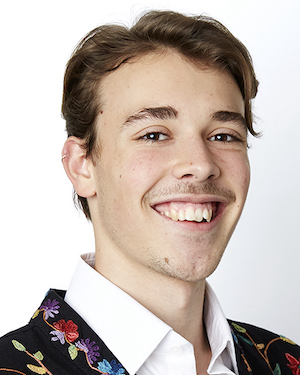
Fight On Forever ⟩
May 31, 2022, by Seth
The moment five years in the making has finally arrived: graduation day! These sorts of entries are particularly challenging for me. Growing up, I was the type of yearbook writer who would ruminate for days about how to capture a year in review. But this is not that. It’s not one year, it’s not just five years, it’s an attempt to capture a life that I had built, that I built with all of you reading this. From my biological to my found and chosen, and my Chan and Trojan families, I am who I am today because of your guidance and kindness. A person who is closer to the one I wish I could’ve been five years ago.
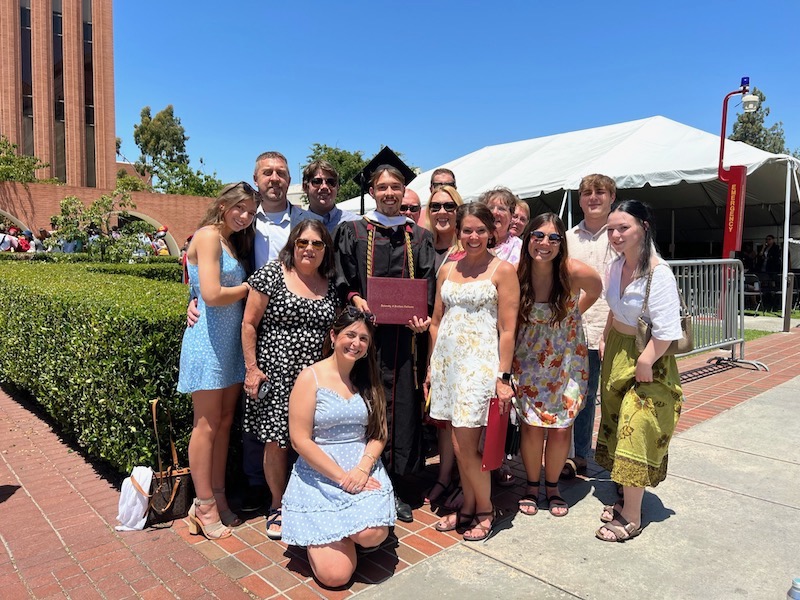
The entire state of Ohio, also known as my family, flew out to show their love as they have always done
I am writing to you now from my childhood bedroom back in Ohio a couple weeks after the dust of the pomp and circumstance, followed by a cross country move has begun to settle and I am thinking about the things I will miss in an attempt to keep that dust away. I’ll miss catching the sunrises on countless intercampus shuttle rides and filling the time catching up with my fellow BS-OTs. I’ll miss trying to get a laugh in OS Minor presentations by calling Chan’s social media “hip, fun, funky, and fresh” because it is, our Chan ambassador team meetings, and especially making holiday baskets with Ambassador Alyssa for our campus partners.
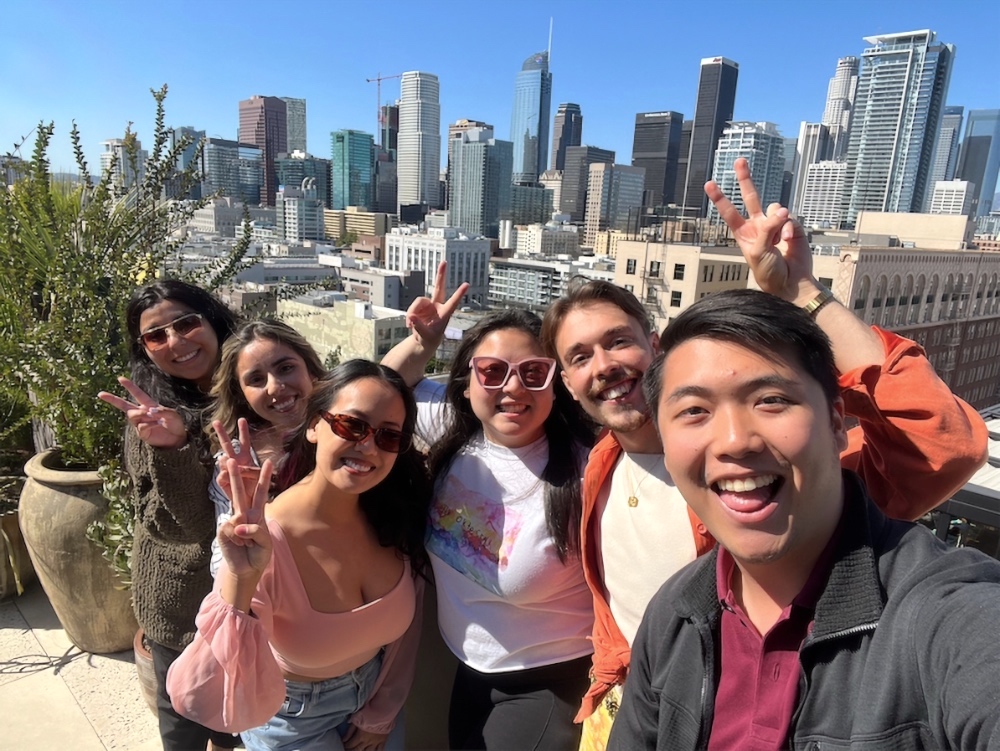
Forget the Avengers, this Chan Ambassadors assemble!
Then there are those moments where I would try to convince some poor classmate to skip or duck walk down the hallways of CHP with me during breaks just to catch them crack a smile by the time we make it to the door, picnics in the quad grass during lunch, and every single time I ran into faculty in the hallway because no matter which semester you took a class with them they left the impression that you just couldn’t wait to talk to them again. Every bi-semester BS-OT gathering, every conversation about OS and OT current affairs (yes, even the one during our end of the year celebration), every CHP fashion runway event, and every single second spent with all of you is a treasure worth more than I could express.
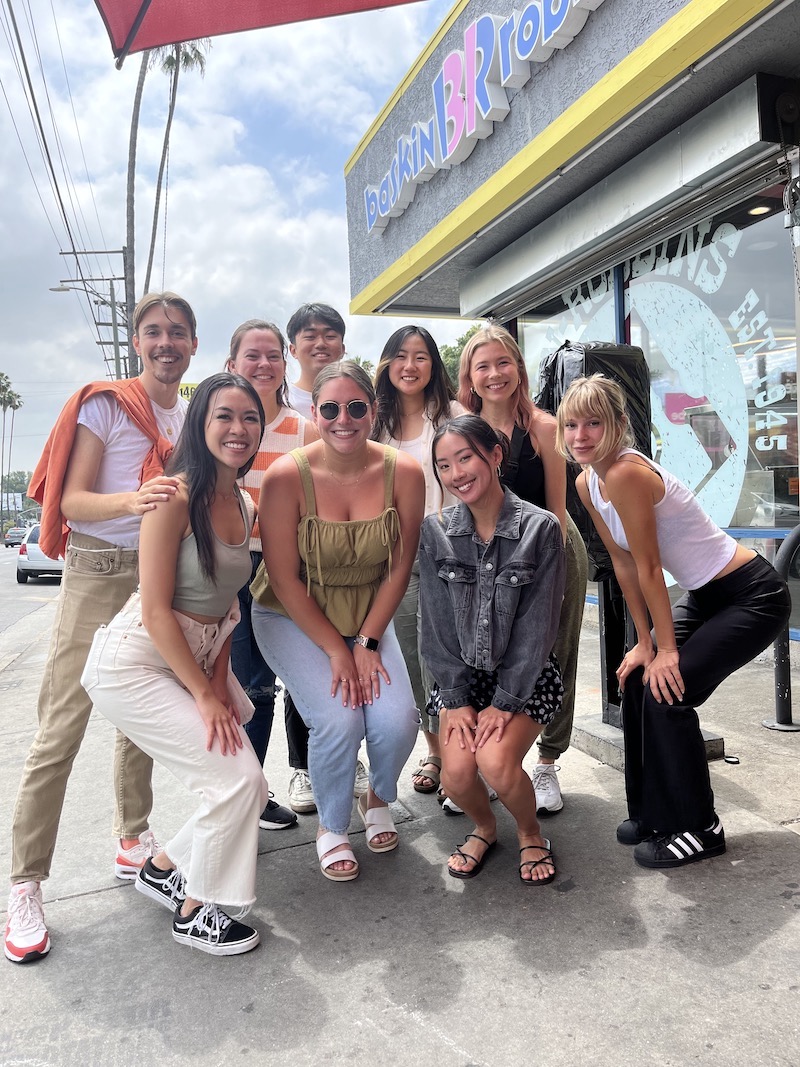
The graduating BS-OT class of 2022! To quote Elle Woods from the 2001 smash hit, “we did it!”
I know that, hard as I try, the dust will settle. II also know that with time it will become rosy instead of grey. Change can be challenging, but it is the only thing that happens without fail. We can only hope to face it head-on and with our loved ones not just beside us, but within our hearts. After all, we’ve been working toward change for so long. So here is to the next journey. And no matter the twists and turns that the universe has in store for us, we will fight on and we will do so forever.
I am sending so much love to you all and hoping you can feel it!
Stay groovy,
Seth
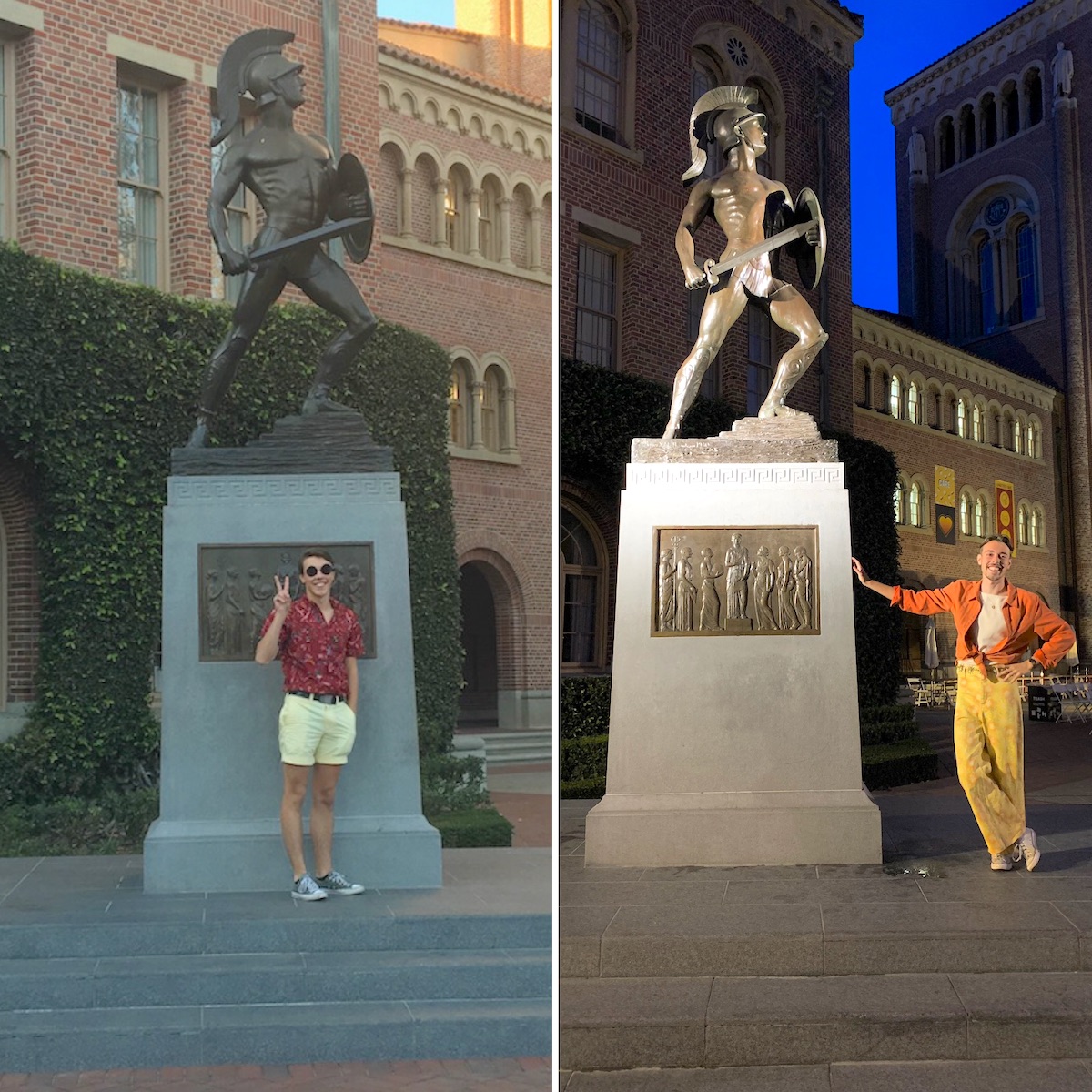
From the end of my first semester to the end of my last, a trojan through and through ✌️
⋯

Humans of USC Chan Volume 3 ⟩
April 20, 2022, by Seth
Community Diversity What are OS/OT?
Committing to graduate school is a big decision and exploring which ones may be the best fit for you can be an equally arduous experience. I remember when I was looking into occupational therapy programs, I looked at the standard quality and cost components, but as a queer person, I was also looking for a place and a profession that I felt could let me blossom as I transitioned into a new life stage (i.e., adulthood, a professional, and, let’s be honest, a world outside of the closet). I wanted to know if I could drop my hairpins or if I had to censor myself. I wanted to know if I could bring LGBTQIA+ topics into the classroom without being anxious about how they would be received. Would I feel isolated or could I find a community? My community? What are my classmates’ experiences, and what can I learn from them? These questions can be hard to find and directly seeking them out can be intimidating or a moment of self-disclosure that may not feel right yet. After all, it’s not often you see these experiences plastered on a program’s website. So, I took it upon myself to do just that.
I hosted a forum with some LGBTQIA+ students within the Chan Division to talk about how they discovered occupational therapy, their relationship with the profession, and their experiences navigating an occupational therapy program. This is a video curated by a queer person in partnership with queer people. And this one is for the family! We even share some advice for those thinking of applying to a program. If you choose to watch it through YouTube, the video is time-stamped with each topic if you ever want to go back to a specific conversation.
I hope you find this video helpful and that these diverse perspectives give you more insight into what LGBTQIA+ student life is like in the Chan Division! Welcome back to the Humans of USC Chan!
⋯

Welcome to the Trojan Family! But first, maybe Trojan Friendship? ⟩
February 28, 2022, by Seth
I have, once again, been thinking about the future and as we all prepare to transition into new chapters, my mind keeps coming back to one part of the experience: making friends.
Much like everything else in life, graduate school is a rollercoaster of experience! There are peaks and valleys, and while you’re slowly ticking your way to the top or racing down the hill, it can be hard to remember there are other people on the ride too. It can be a lonely experience, after all. You may be moving across the country, your friends may now be employed full-time, and said plainly adult relationships can be hard! I have been a graduate student for two years now and I still feel these things sometimes. I’m sure these feelings will continue as I move into my next chapter too, but there are ways that we can put ourselves out there and meet other people! I’ve compiled a list of strategies that I have been tinkering with lately and I hope that in advance of your transition, whatever and wherever it may be, something sticks. The one thing they do have in common, however, is putting yourself out there. The frameworks in place are just that, foundations, and it is up to you to build them up!
Schedule and Protect Your Time
I want to start off with some sage advice my lifestyle redesign course received from Dr. Camille Dieterle this semester. She encouraged us to look at our calendars and see when we were having fun versus our responsibilities. It is so obvious that you never think twice about it before someone points it out. Suddenly, it was like a lightbulb had turned on, “Of course I’m lonely! I go to class, I go to work, I go to sleep and repeat.” Where in that mix am I living my twenties? You may be tempted to acknowledge this and commit to making a change, but you must remember that whatever you schedule for you, make sure to protect it! If you’re going to a museum on Friday, don’t agree to a meeting at that same time. I am two weeks out from living this advice and I have already done more things with my friends within that time than I have all last semester.
Take Advantage of the Structures in Place
This suggestion covers a lot of ground. This could mean joining the social media groups for your academic class, a club meeting, a post-final get-together, or it could be a university-wide event; the campus is your oyster! All of these avenues contain a safety net if you’re finding yourself flying solo. What I mean by this is if you are nervous about showing up alone or you’re more of a wallflower, you’ll always have something to start a conversation about: USC! We often laugh at orientation-style ice breakers, but they exist for a reason. My advice is to start with a compliment (“I love your overalls”), introduce yourself (“I’m Seth, it’s nice to meet you!”), and roll right into the “What’s your major?” conversation (“I’m studying occupational therapy, let me explain what that means . . .” (IYKYK). Did I use this exact conversation just this weekend? Yes. Did I walk away with four new friend phone numbers? Yes! All I have to say is if it ain’t broke, don’t fix it!
Find Your People
I’m not just talking about those with similar hobbies or people you just *vibe* with; I’m talking about dropping your hairpins and stopping the code-switching, I’m talking about finding your People with a capital “P”. I highly encourage you to seek out your cultural student organizations and your communities beyond the campus boundaries. Find the people who lift the weight of your shoulders and nourish your soul in a way that only people who get it, and get you can. They’re out there, I promise!
Keep Your Roots
It may go without saying, but I think it is important to reiterate. You still have all of the friendships you had before graduate school! They may look a little different, but that doesn’t mean they are gone. Don’t be afraid to schedule a weekly check-in phone call or a tri-monthly zoom call (and make sure to protect it!). Keep sending each other those memes, let them crash on your couch when they’re in town, and visit them when you go home. Whatever your transition may bring, know that you’ll still have someone to turn to and that you’ll navigate it together.
After all of these tips I do want to add a caveat: I’m not saying you have to make the bestest of friends. Graduate school may feel long in the moment, but it goes by in the blink of an eye. Do not feel pressured to walk away from the experience with the friendship equivalent of a soulmate (If you do, I love that for you). What I am saying, though, is that it helps to have a shoulder to lean on and someone to celebrate with. It helps to have a friend, no adjective is needed. With that said, to those entering the E-OTD next year, to our incoming BS-OTD students, and to anyone who is going through a transition soon, welcome to the Trojan Friendship and thank you for being a friend.
⋯

Welcome to Procrastination Nation! ⟩
January 21, 2022, by Seth
Hi, my name is Seth, and I am a chronic procrastinator. If you know me at all, this is probably no shock to you, and if you don’t know me that well, please say hello to what should be my hamartia! While I’m laying all of my cards on the table, I should also confess that I’ve procrastinated writing this blog. To be clear, it’s not because I don’t want to write this blog or that I’m so busy that I have so many other things to take care of, it’s that I just live for a deadline. I’ll explain more on that in a sec, but first, we need to dig into the realities of procrastination first.
Procrastination is often only portrayed as this debilitating habit that we must overcome to become masters of time management and there is truth to this! I’m sure many of us are too familiar with procrastination that has been taken too far. Who can’t recall the time they cut things too close or ended up not showcasing our best work? This is a reality of procrastination, but it is not the only reality. Real-life is rarely this black and white and there are some theories to back this up! The Yerkes-Dodson Model (1908) details a quadratic relationship between arousal and performance where there is a range of optimality. Another way to talk about this in occupational therapy is a challenge-skill relationship where that optimal range results in a flow experience; one of complete immersion in the task at hand.
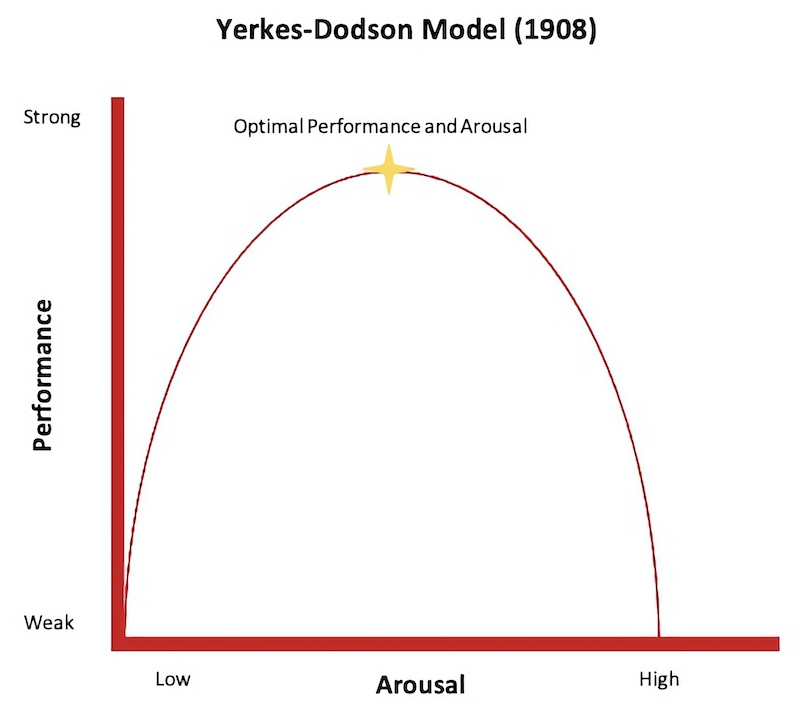
Here’s a visual of the Yerkes-Dodson Model! Everyone’s graph looks different depending on their own internal relationship to arousal and performance.
This is to say that eustress, or good stress, can improve the work you have just as much as the other ranges in this relationship can negatively impact your work. While operating under this perspective I have come to find that, for me, procrastination is less about time management and more about emotional management. Earlier I mentioned that I live for a deadline and this is why! I manufactured the perfect challenge for what I perceive to be my skill and viola! I finally get to the work at hand. By now you’re probably thinking, “This is great news, Seth! I feel so validated, but knowing this doesn’t change the feeling in my gut when I’m procrastinating.” And I’m right there with you, so here are some of the thing’s I’ve found that help me work through that feeling:
Using an Eisenhower Box
The strategy I always have in my back pocket and my first line of defense is the Eisenhower Box. This tool is essentially a way to organize tasks into four quadrants based on urgency and importance. Although I’ve found this is a great way to strategize, I always let my gut feeling play a role in the decision-making process, and I encourage you to do the same.
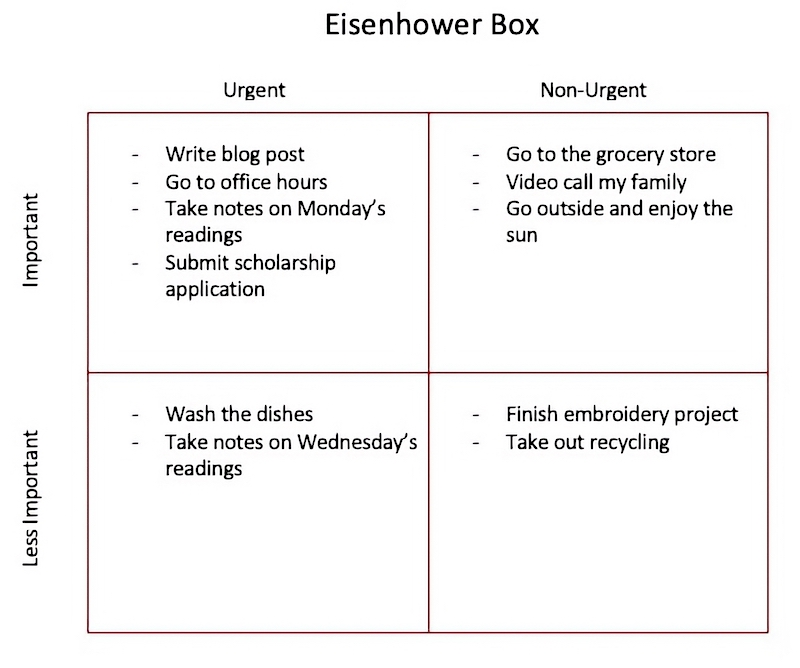
Here’s an example of my Eisenhower box at the moment! It’s constantly changing and even the tasks showed here can switch quadrants depending on when I re-evaluate my box.
Productive Procrastination
Maybe the best strategy I’ve used to generate enough stress to reach my optimal level is to productively procrastinate. This may mean tackling some of the more non-urgent and less important tasks in your Eisenhower box. This often manifests in cleaning your entire living area before starting your readings or just absolutely having to run that errand before writing that paper. This allows you to get other things done while slowly restricting the avenues you have to procrastinate. This leads me to my next point!
Removing Distractions
This is a natural extension of productive procrastination but goes beyond the things that are also on our to-do lists. I’m talking about our phones, the show we’re binge-watching, or the roommate who decided to invite company over right before that first big assignment is due. For me, this means putting my phone in some random drawer in the kitchen, sitting in a place that is not my bed, and either having absolute silence or music that drowns out whatever other noise is around. Take a look at the things that usually distract you and brainstorm ways to work around them.
Diaphragmatic Breathing
Whenever I think about this strategy, I laugh because breathing exercises have always ended up stressing me out more, but this one is a game-changer. Breathing from the abdomen (as opposed to the chest) is a quick way to elicit relaxation. It can release muscle tension, slow the heart rate, and lead to a hearty supply of oxygen to the blood. Try breathing from your chest and then your abdomen, then take note of any difference. If you’re procrastinating and find yourself starting to breathe from the chest, switch the style up.
Knowing Yourself and the Resources Available
I gave a couple of suggestions that have worked for me, but what it all comes down to is knowing yourself! Reflect on how long things have taken you before, your performance on these tasks, and what strategies work for you in managing your stress and procrastination. If you’re trying to find your optimal performance-arousal range, take note of the stress signs that start manifesting for yourself. Figure out when you’re most productive and take advantage of that time (but don’t be afraid to dedicate it to more meaningful occupations too). If you need some help, don’t be afraid to ask! The USC Kortschak Center, an occupational therapy collaborative resource center, has plenty of strategies and consultations that can get you on the best path for you.
Don’t get me wrong, I am not necessarily endorsing procrastination. All, some, or none of this may resonate with you, but I hope that it encourages you to reflect on your procrastination habits. As we head into the third week of the spring semester, I invite everyone to give themselves a little more grace around their habits. Coming around to see that there can be ambivalence around procrastination is a great step in making positive change. It helps us shift the narrative from thinking “I should stop procrastinating” to “I could do XYZ” to make that change more manageable, intentional, and personalized. So get out there and make the change, or put it off until tomorrow! Either way, I hope you’ve enjoyed your stay in Procrastination Nation.
⋯

A Few (5) of My Favourite Things ⟩
December 27, 2021, by Seth
It’s the time of the year where time is on everyone’s mind. I mean, it’s kind of hard for it not to be when four days from now many of us will be watching a giant clock countdown to the Gregorian calendar new year. As I prepare for the year to come, I’d like to reflect on the years that have passed, specifically the past five years of the BS-MA program, and share with you all my favourite things from each year. I’ve already shared about my BS-MA cohort, so this will focus on the progressive degree experience itself. As I mentioned before, the program offers you a breadth of flexibility in designing your own experience while also being structured with prerequisite courses before you officially enter the graduate program. With that said, no two students’ journeys are alike.
Year 1: An Introduction to OT and OS
This is where the magic begins! The first year is where, at the very least, you take OT 250 and I cannot imagine a better start to the USC Chan journey. It’s a sort of an all-you-can-eat buffet of OT where you’re exposed to the breadth of what OT brings to the table. This course covers motivational interviewing to lifestyle redesign, flow to challenge-skill balance, stress management to sleep, habits and routines, and much, much more. As a testament to how much I enjoyed this class, I remember the final with Dr. Kate Crowley like it was yesterday. My group was assigned to present on the stress management module and we chose to recreate a traffic scenario one of my group members had experienced. We converted the wheely chairs in the classroom into cars and re-lived the experience in front of the class with classic movie voice-overs to narrate the scene and what was happening in the body. Now that’s how you end your first semester the right way!
Year 2: The Intercampus Shuttle
Depending on the specific way your cookie crumbles this moment may come sooner, but by year two you’re ready for the intercampus shuttle! USC has shuttles that go to many places, but the intercampus shuttle stops at the main campus (UPC), Union Station, and the health science campus (HSC). The shuttle runs about every 30 minutes or so and takes about as long. Believe me when I say, to this day I still love this bus. It’s the perfect time to catch up with your cohort, listen to some music, nap, or cram in some last-minute studying for anatomy or physiology. More than this, it made me feel like a ✨professional!✨ You’re commuting, you’re on a health science campus in the heart of OT at USC, and living the dream. Honestly, they might as well just hand you your degree right then and there (well, maybe not yet, but you’re definitely on your way)!
Year 3: Foundations
Although split between year three and year four, this is when you start taking the graduate-level foundational courses and it is designed in a way that makes the transition so smooth. This year is when you wrap up any double majors or minors so you’re still taking an interdisciplinary course load, but you’re starting to get into the bread and butter of OT at the same time. This time is precious because you take these foundation courses with your BS-OT cohort. Not only are you strengthening those relationships, but you’re also starting to build new relationships with the graduate faculty in a more intimate classroom setting. From the small group discussions and practical applications to the professor interactions, this experience brought everything I learned up until this point into focus and I felt prepared for the next chapter of the program.
Year 4: A Program Within a Program
And the time has finally arrived, you are a graduate student! If that isn’t exciting enough for you, you’ve now also expanded your network of OT-lovers to include 140 more people! Although this may feel intimidating at first, you will be split into a smaller immersion cohort with whom you will travel through the rest of the program. This program within a program includes Mental Health, Pediatrics, Adult Physical Rehabilitation, and the newly introduced Productive Aging and Geriatrics immersions. Year 4 will continue the building on Year 3’s foundations while also guiding you to be responsive, reflective, and engaged in your future practice and giving you a taste of what that practice could look like. This year is so exciting because you start to feel what it’s like to be a real-life OT!
Year 5: The Freedom to Choose
As I am still in my fifth year, I cannot capture it in 20/20 hindsight, but I can share something that I am sure will be my upcoming favourite. Sometimes you just don’t click with a required course which, I’m here to tell you, is not a bad thing! It’s a good sign that you are starting to hone in on the OT you want to be and in year five you get the chance to create your own adventure. When you reach this point in the program, you’re able to start selecting the electives you’d like to take before graduating. These courses can contribute to advanced certifications, enrich your knowledge in a particular practice area, or just help you strengthen your general skills as an OT and you get to choose them! It’s like being a first-year again, but this time you know what you’re looking for. The freedom to choose goes beyond electives, however, and also encompasses your next steps. What type of residency would you like? What practice area will you pursue? Will you seek out any additional degrees? Take some time to reflect on everything you’ve done so far and start asking yourself these questions. The future starts now!
Although I advertised 5 favourite things, in the true spirit of looking forward, here is a bonus sixth favourite thing to celebrate the sixth year of the new BS-OTD!
Year 6: The Last Chapter
The fact that you have to say goodbye makes the journey up to that moment all the more special. Relish each year you have here and carry it, and the people you met along the way, with you as you move forward, but do move forward. You’ve put in the work and you are ready. Here’s to graduation (whenever that may be for you)!
⋯





